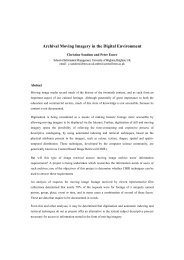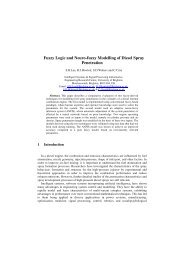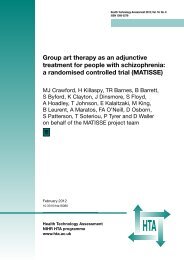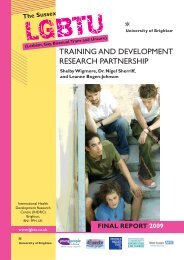TOP TIP - University of Brighton Repository
TOP TIP - University of Brighton Repository
TOP TIP - University of Brighton Repository
You also want an ePaper? Increase the reach of your titles
YUMPU automatically turns print PDFs into web optimized ePapers that Google loves.
Reaching and Engaging Young Fathers<br />
20<br />
Reaching teenage<br />
and (school-age) fathers<br />
Supporting Young Fathers<br />
Accessing school-age fathers raises quite different challenges to<br />
accessing older young fathers. There is a considerable lack <strong>of</strong><br />
understanding and research about teenage and/or school-age fathers. We<br />
know little about how many there might be, how many maintain close<br />
relationships or what forms their relationships might take.<br />
‘It’s hard to identify young fathers because he’s not carrying the<br />
belly - so engaging means it’s <strong>of</strong>ten about him coming forward,<br />
and having someone in school that he can come forward to, such<br />
as mentors and designated teachers.’<br />
Significant gaps remain in service<br />
provision for teenage and/or<br />
school-age fathers. In some ways<br />
this is not surprising given the<br />
complexities involved in working to<br />
strike a balance between child<br />
protection concerns and the young<br />
fathers’ support needs. Moreover, (and<br />
as we noted in the introduction) few<br />
projects and agencies work specifically<br />
with fathers under 16 years, partly<br />
because <strong>of</strong> prevailing beliefs that such<br />
individuals can be so ‘hard-to-reach’.<br />
For instance, school-age fathers may<br />
be less interested in attending<br />
organised sessions than their older<br />
counterparts. Given their youthfulness,<br />
teenage fathers are likely to be<br />
immature, and perhaps unable or<br />
unwilling to understand the nature and<br />
level <strong>of</strong> their responsibilities. They may<br />
also be less willing to be pinned down<br />
by time appointments (Mordaunt,<br />
2005). Furthermore, young fathers<br />
who are at school may be wary about<br />
taking time <strong>of</strong>f for appointments,<br />
preferring not to draw attention to<br />
their status.<br />
Practitioners wishing to <strong>of</strong>fer support<br />
for the youngest fathers mentioned a<br />
number <strong>of</strong> barriers they have faced.<br />
For example, the difficultly in finding<br />
such fathers (their ‘invisibility’),<br />
the lack <strong>of</strong> support mechanisms if such<br />
fathers are identified, complicated<br />
circumstances with the mother and<br />
her family, educational difficulties<br />
(sometimes including behavioural<br />
problems), and the attitudes <strong>of</strong> some<br />
staff (e.g. social workers and school<br />
employees). But some projects told us<br />
that not only can the work be done, it<br />
can be done well.<br />
The Health Initiatives Team at<br />
Education Leeds work exclusively with<br />
school-age parents (and parents-to-be;<br />
mothers and fathers) and the teenage<br />
male partners <strong>of</strong> school-age mothers.<br />
The team has developed considerable<br />
expertise in working with young<br />
parents <strong>of</strong> compulsory school-age (see<br />
In Focus, next page).<br />
Other projects and services currently<br />
delivering support for teenage fathers<br />
(but not necessarily school-age fathers)<br />
include the Young Fathers Project in<br />
Lewisham, <strong>Brighton</strong> and Hove Young<br />
Fathers Project, B2b+ in Sunderland,<br />
T-BAG in Halifax, Fathers First in the<br />
Isle <strong>of</strong> Wight, UKdadsposse and the<br />
Potential Project in Oxford, and the<br />
TPSS in Hull. See List <strong>of</strong> Contacts on<br />
p60 for details.
















